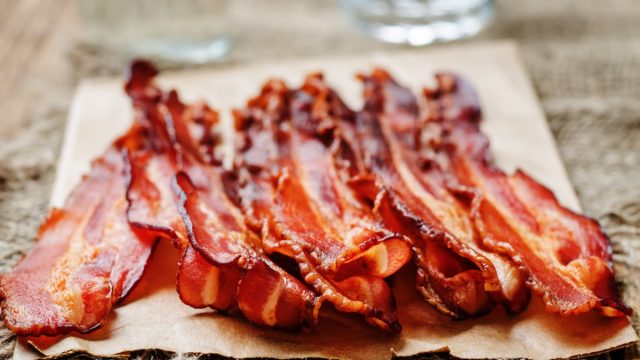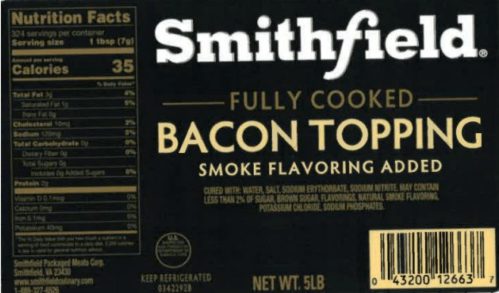If You Have This Bacon in Your Fridge, Don’t Eat It, USDA Warns

Bacon is a widely beloved breakfast staple, whether you’re a fan of standard pork bacon, the turkey alternative, or even vegan varieties. The salty side is also a key component of the classic BLT, and a welcome addition to burgers and grilled cheese sandwiches. But if you grabbed certain bacon products at the supermarket lately, you may want to think twice before indulging, according to the U.S. Department of Agriculture’s (USDA) Food Safety and Inspection Service (FSIS). Read on to find out which bacon product officials have urged consumers not to eat.
READ THIS NEXT: If You Have This Meat in Your Freezer, Throw It Out Now, USDA Warns.
There have been multiple concerns about the safety of certain meat products lately.

Recalls of different meat products have been making waves over the past few months, including everything from ground beef to ready-to-eat (RTE) chicken breast fillets. One recent concern surrounded a popular deli meat sold at Walmart locations in Illinois, Indiana, and Ohio. The “Great Value Black Forest Ham Water Added” products were potentially undercooked, prompting the FSIS to issue a public safety alert on May 18.
The same day, RTE sausage sticks and luncheon loaf products were voluntarily recalled by America New York Ri Wang Food Group Co., Ltd. due to potential contamination with “extraneous materials” such as metal. As it turns out, your bacon could be tainted, too, as certain products are subject to a new recall for similar contamination issues.
Do not eat these RTE bacon items.

According to a May 20 announcement from the FSIS, Smithfield Packaged Meats Corp. has voluntarily recalled nearly 185,610 of its RTE bacon topping products. The bacon products are potentially contaminated with extraneous materials such as metal, the agency warns.
The products were shipped to different distributors and retail locations across the country and may have also been used in the production of other products. The FSIS asks that distributors and retailers not sell these products, and consumers are advised to either throw the items away or return them to their place of purchase. The agency specifically urges consumers not to eat any bacon products that are part of the recall.
RELATED: For more up-to-date information, sign up for our daily newsletter.
Here’s how you can check to see if you have any affected items.

If you use bacon on your sandwiches, crumble it as a salad topping, or eat it with your eggs and toast, you’ll want to make sure you don’t have recalled items in your kitchen. All recalled products are five-pound packages that have an establishment number of EST. 27384 inside the USDA mark of inspection. The items were produced between Feb. 21, 2022, and Feb. 23, 2022, and later between March 3, 2022, and March 5, 2022.
Recalled products include Golden Crisp Patrick Cudahy Precooked Bacon Topping, which had a stock-keeping unit (SKU) of 432000 12002, found below the barcode, and lot codes 2054, 2062, and 2063; Smithfield Precooked Bacon Topping, with a SKU of 43200 12003 and lot codes 2063 and 2064; Golden Crisp Patrick Cudahy Fully Cooked Bacon Topping Applewood Smoked, with a SKU of 43200 12296 and lot codes 2053 and 2062; and Smithfield Fully Cooked Bacon Topping, with a SKU of 43200 12663 and lot code 2064.
Also recalled were Member’s Mark Fully Cooked Bacon Crumbles, with a SKU of 78742240923 and a Best If Used By date of 2022-11-18. Member’s Mark is the in-house brand sold at Sam’s Club. If you frequent the warehouse store, be sure to make sure these crumbles didn’t end up in your shopping bag.
Concerned about your health? Reach out to your doctor.

The issue was discovered thanks to a customer, who complained to Smithfield that they had found metal in one of the RTE bacon topping products. While there have been no reported injuries or adverse reactions connected to consumption of the bacon products, if you are concerned about illness or injury, the FSIS asks that you contact your healthcare provider.
For questions specific to the recall, consumers can reach out to the Smithfield Consumer Affairs hotline at 1-844-342-2596, the FSIS said.
READ THIS NEXT: If You Have Any of These Popular Chocolates, Do Not Eat Them, FDA Warns.